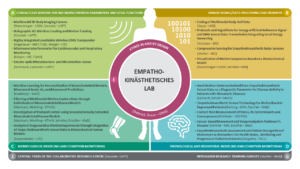Overview
Overview
The research areas of EmpkinS cover the entire scientific spectrum of innovative sensor technology. They range from primary sensor technology (project area A), signal and data processing (project area B), and the associated modeling of biomechanical, neuro- and psychomotor and (patho-) physiological processes in human beings (project areas C and D) to the medical or psychological interpretation of the sensor data (project area D). Since research on and dealing with empatho-kinaesthetic sensors raises important ethical and social issues, this complex problem is dealt with in a separate project area E – with reciprocal connections to project areas A through D.
Project area A researches different wave and radio-based sensor technologies for the remote detection of motion parameters of the human body. The targeted new sensor concepts achieve a precision, measuring rate, dynamics and fine-grained resolution in all dimensions (6D pose, 3D body surface and 3D speed with the respective time course of all values) that are at least one order of magnitude better than the current state of the art. In spite of these outstanding target characteristics, the sensors for the intended area of application must still have the potential for compact, cost-effective implementation and for mobile, ubiquitous use.
See more
Project area B researches innovative methods and solutions for efficient sensor signal processing and transfer. All parts of the processing chain such as the sampling of the high-dimensional, continuous, physical signals, the efficient source coding of the scanned sensor values, the energy-saving mobile sensor data transfer, and the visualization are addressed.
See more
Project area C explores approaches to processing, modeling and interpretation of biomechanical data. This is an integral part of EmpkinS in order to obtain meaningful movement information on the basis of the large amount of available measurement data, which originates from innovative measurement principles and therefore entail completely new requirements for further analyses to be carried out.
See more
In project area D, sensor technologies and empatho-kinaesthetic procedures are researched in various diseases and internal states. Important aspects in this project area are the research into medical and psychological body function models for the transformation of the sensor-based EmpkinS measured variables into clinically relevant parameters and the research into new forms of diagnosis and therapy that are based on these parameters and the EmpkinS body function models. The overriding goal is to assign a medical or psychological relevance to the sensory parameters. In order to achieve this, the sub-projects focus on different (patho-) physiological states. These states are characteristic of the disease models examined and include prototypically disturbed body functions, whereby the applicability of the different methods is to be demonstrated.
See more
Project area E researches the ethical, legal and social issues in the context of EmpkinS and develops orientation marks for its future societal design. In the sense of an “ethics in and by design” approach, the aim is not only to critically accompany technological development, but also to sound out and implement specific design and decision paths. When researching the normative core concepts, the focus is on the concepts of human dignity, informational self-determination, justice and solidarity in times of big data and research and applications driven by algorithms. Furthermore, the social attitudes and values affected by EmpkinS are examined, along with the effects these have on the social evaluation of EmpkinS, and the weighting of normative criteria.
See more
The integrated Research Training Group (iRTG) provides a structural framework for the graduate education of the doctoral candidates and promotes the development of their scientific profile und their capacity building. The variety of specific measures enables the doctoral researchers to work on their academic qualifications in a structured and targeted manner. Particular attention will be payed to their effective networking as well as intensive communication skills and the nurturing of scientific independence. Doctoral researchers of the iRTG EmpkinS will have two co-mentors, who are principal investigators of the CRC.
See more
The office of the CRC will be responsible for all organizational, coordinative und administrative tasks, in order to carry out the CRC successfully and according to the rules of good scientific practice. This includes the management of centrally requested funds, the support of internal communication, early career support, the organization of training and continuing education that is not part of the IRTG, the implementation of equal opportunities measures, the coordination of EmpkinSLab, and public relation measures.
